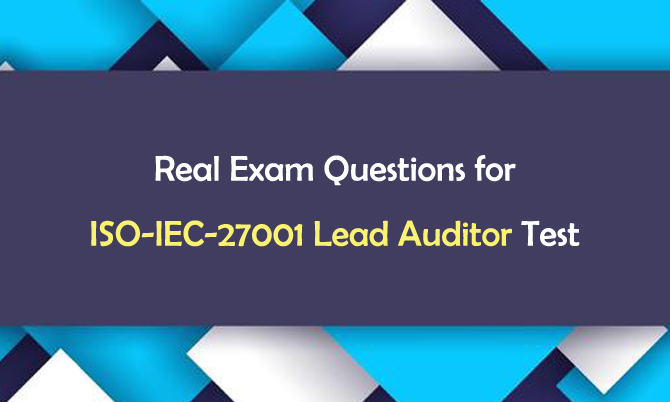We all know that ISO-IEC-27001 lead Auditor exam is a hot one of PECB certification tests. Many PECB candidates will choose this exam to take for enhancing the career. ISO/IEC 27001 Lead Auditor enables you to develop the necessary expertise to perform an Information Security Management System (ISMS) audit by applying widely recognized audit principles, procedures and techniques. With using our latest ISO-IEC-27001 Lead Auditor real exam questions, you can prepare the test well.

Basic Information for ISO-IEC-27001 Lead Auditor Exam
To prepare ISO-IEC-27001 Lead Auditor exam, you will be able to master audit techniques and become competent to manage an audit program, audit team, communication with customers, and conflict resolution. After studying our PECB certification ISO-IEC-27001 Lead Auditor real exam questions, you can sit for the ISO-IEC-27001 Lead Auditor exam and apply for a PECB Certified ISO/IEC 27001 Lead Auditor credential. By holding a PECB Lead Auditor Certificate, you will demonstrate that you have the capabilities and competencies to audit organizations based on best practices.
PECB ISO-IEC-27001 Lead Auditor Exam Domains
PECB ISO-IEC-27001 Lead Auditor exam domains cover the following details.
Domain 1: Fundamental principles and concepts of Information Security Management System (ISMS)
Domain 2: Information Security Management System (ISMS)
Domain 3: Fundamental audit concepts and principles
Domain 4: Preparation of an ISO/IEC 27001 audit
Domain 5: Conducting an ISO/IEC 27001 audit
Domain 6: Closing an ISO/IEC 27001 audit
Domain 7: Managing an ISO/IEC 27001 audit program
Share some PECB ISO-IEC-27001 Lead Auditor Real Exam Questions
PECB ISO-IEC-27001 Lead Auditor real exam questions can help you test all the above domains. Share some PECB ISO-IEC-27001 Lead Auditor real exam questions and answers below.
1.After a devastating office fire, all staff are moved to other branches of the company. At what moment in the incident management process is this measure effectuated?
A. Between incident and damage
B. Between detection and classification
C. Between recovery and normal operations
D. Between classification and escalation
Answer: A
2.You receive an E-mail from some unknown person claiming to be representative of your bank and asking for your account number and password so that they can fix your account. Such an attempt of social engineering is called
A. Shoulder Surfing
B. Mountaineering
C. Phishing
D. Spoofing
Answer: C
3.Information has a number of reliability aspects. Reliability is constantly being threatened. Examples of threats are: a cable becomes loose, someone alters information by accident, data is used privately or is falsified.Which of these examples is a threat to integrity?
A. a loose cable
B. accidental alteration of data
C. private use of data
D. System restart
Answer: B
4.Cabling Security is associated with Power, telecommunication and network cabling carrying information are protected from interception and damage.
A. True
B. False
Answer: A
5.What is we do in ACT - From PDCA cycle
A. Take actions to continually monitor process performance
B. Take actions to continually improve process performance
C. Take actions to continually monitor process performance
D. Take actions to continually improve people performance
Answer: B
